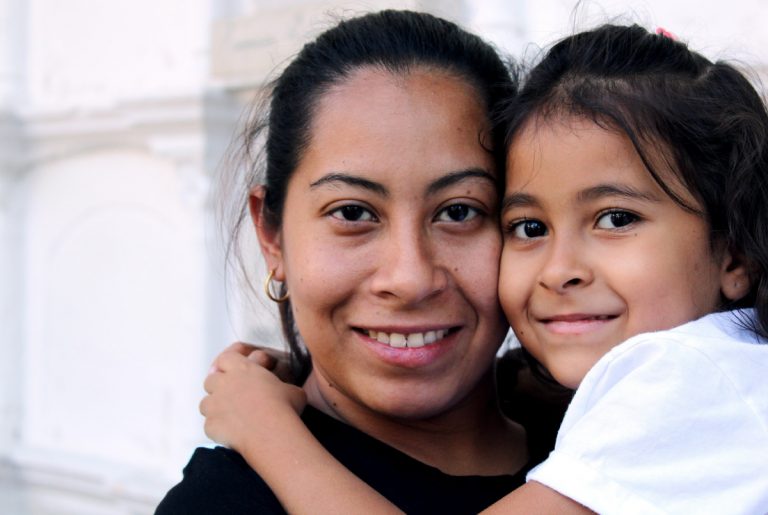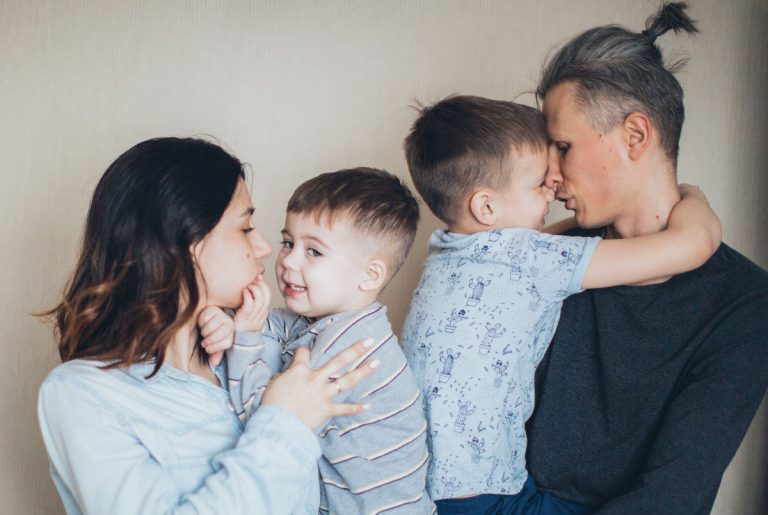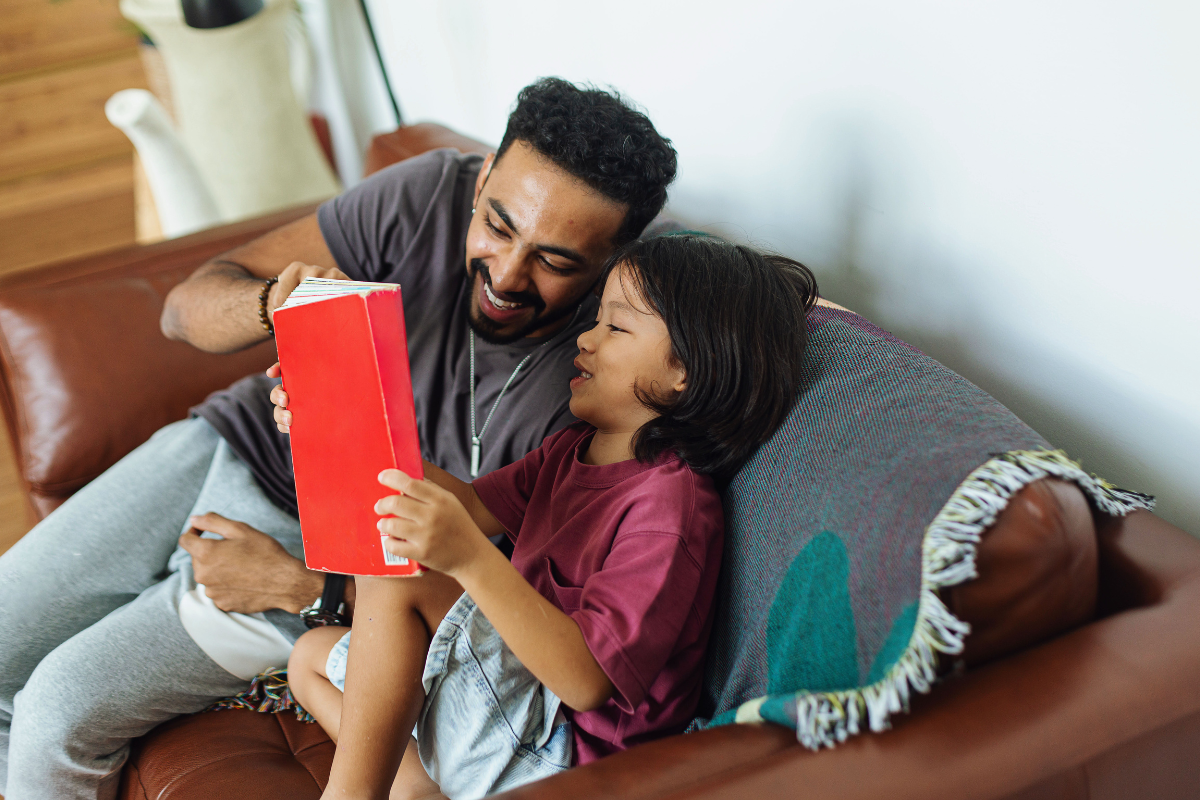Talking to your kids about separation and divorce can make ending a relationship even more complex. Some couples might even wonder whether it’s easier to just stay together, to avoid the turmoil and potential difficulties of change.
It’s normal to be worried about the impact of separation on your child. Research tells us that children struggle the most during the first couple of years after a family separation and that they might experience some level of anxiety, anger and emotional distress.
Fortunately, there are things to avoid and strategies you can use to support your child – or children – at every age and stage of their development.
Explaining separation and divorce to your children
Regardless of how old they are, talking to your kids about separation and divorce can really help them adjust to the changes happening in your family.
Keep it simple and limit the details
You’re likely to be feeling pretty emotional, and your feelings about your ex-partner could accidentally creep into the conversations you have with your child. So, try to stick to the facts, and only share information appropriate to the age of your child – we’ll speak more about this later.
Right now, your child needs to know high-level information, like what’s happening, where they’ll live and how care arrangements are going to work. They also need your reassurance that your love for them hasn’t changed and that, although things are tough right now, they will be OK and you’ll get through it together.
You might say something as simple as “[their other parent] and I love you so much and that will never change, but so we can keep looking after you as well as we can, it will work the best if we live apart.”
Give them a chance to ask questions
They’ll be curious about what’s happening and how things are going to change. It’s totally normal that they’ll want to figure things out, so be prepared for all sorts of curly questions.
If you don’t know the answer, it’s okay to press pause and either come up with an answer once you’ve had chance to think, or consult with the other parent to make sure you’re on the same page when it comes to explaining the situation.
Try something like, “That’s such a great question, and I can see why you’d want to know that. Can you give me a little bit of time to think about it and come back to you with an answer?”
If you give them a chance to ask questions, and are as transparent as you can be, children are more likely to come to you to talk things through – rather than bottling up their questions and subsequent feelings, or using their imaginations to try and make sense of what is happening. Think about what will be helpful for them to know.
Keep the dialogue open
One conversation isn’t going to cut it. Make sure your child knows they can come to you at any time to ask questions or talk about how they’re feeling.
Emotions and experiences will change as you all process different stages of being separated – breaking the news, moving out, first holidays and celebrations as a two-household family. You might even encourage a regular chat each week or fortnight to check in with them and see how they’re travelling or if any new questions have come up. Encourage them to ask questions as they arise as well.
Find someone they can talk to outside of your immediate family
You might have a family friend, aunt, uncle or grandparent you can count on to be a neutral person that your child can confide in. Let your kids know how and when they can contact this person, as they may need space or new perspectives to help them process things. Make sure you choose someone who will speak positively about you and the other parent.
Age-appropriate ways for talking to your kids about separation and divorce
The end of their parents’ relationship isn’t an easy thing for your kids to understand or come-to-terms with, and how you communicate it with them can and should change depending on their age.
These strategies are designed to help you manage the separation process with your kids, based on how old they are.
Infants and toddlers: 0 to around 3 years old
Although they’re young, babies and toddlers need specific help and support when you’re separating. They’re sensitive to change and pick up on your emotions. They may become anxious or worried when they’re away from familiar places and people.
Babies can, and often do, experience separation anxiety and this needs to be considered carefully by both parents. This makes it even more important for both of you to put some specific supports in place to help your baby adjust to the change.
Keep routines as familiar as possible.
Ensure that you and the other parent try to stick to similar routines for things like sleeping and feeding. Even though your child’s surroundings might look different, they’ll feel more secure if they’re doing the same things they usually do. You can always create new rules or adapt old ones, but just ensure you and the other parent are collaborating to create consistency.
Provide a transition item.
Two households can mean a double up of many things – two beds, two toothbrushes, two breakfast bowls. But if you can provide something like a toy or cuddle item that goes between both houses, they’ll be able to hold onto something that’s familiar or remains the same, despite the changes happening around them.
Have a slow transition to new places.
Moving to a new place could mean new childcare as well as a new home. Try to introduce them to these new places with as much advance notice as you can so they have a chance to get used to them, rather than changing lots of big things suddenly.
Manage your own big feelings.
We know this can be really hard to do, because it’s completely normal to feel some pretty strong emotions about separating or divorcing – make sure you have lots of support in place for yourself. When you feel settled and calm and can engage in self-care or regulate your emotions, your child is learning directly from you. They’re not only sensing and responding to your feelings but seeing how you cope and manage.
Creating as much harmony as possible between you and the other parent will smooth the way for your baby.
Children: Around 4 to 12 years old
At this age, your child will be full of questions and very aware of the changing circumstances. They’re still too young, though, to fully understand why you and their other parent are separating or why things can’t remain the same. It’s also a time when they may be pushing limits and boundaries and developing an active imagination, which can impact their ability to feel settled after their parents’ separation.
Both parents supporting each other’s parenting.
One of the most important things of all is to reduce conflict between parents. Being supportive of your child’s relationship with the other parent, as long as it’s safe to do so, is one of the most meaningful things you can do for them.
Consistency is key.
Our kids test boundaries – and it’s completely normal for them to do so – but a lack of consistency can cause rule-breaking, tantrums and emotional dysregulation. This might be increased by being parented across two households, so it’s important to try and keep rules clear and boundaries firm but fair.
It might be helpful to sit down with the other parent and decide on some consistent key rules that are non-negotiable. When your child knows you’re parenting from the same page, and the rules and expectations are the same, they’ll feel more settled and secure because they know what to expect, and that (most) things are consistent across both homes.
Reality check.
Young children are starting to develop their imaginations, which means that they can sometimes find it difficult to tell the difference between fantasy and reality. When it comes to your separation, they might also use their imaginations to fill in the blanks.
This can be coupled with another perfectly healthy stage of development, where our kids are a little more self-involved. At this stage, they focus on their experiences and feelings, and are only just starting to learn about other peoples’. This can mean they misinterpret divorce and separation to be about them, or because of them. So, make sure you have clear conversations to ensure they know they had nothing to do with your separation.
Big feelings!
Although children and teens of any age are going to have some big feelings about their parents separating – it’s particularly significant for this age group. Young children are still developing their skills in identifying and responding to emotions. We often see tantrums in the toddler years, but they can continue right up until the age of five and beyond.
It’s important to help your child name their feelings and then work with them to develop coping strategies. Validating and ensuring your child feels that it’s normal and okay for them to experience a whole range of feelings can also really help with emotional regulation. When children see you managing your own big feelings in positive ways, they learn these important skills – they’re much more influenced by what you do than what you say.
Adolescents: Around 13 to 18 years old
Once children reach their teen years, they’ll be striving for independence and you’re likely to start seeing them as more capable.
During separation, some parents might unintentionally ask their teenager to handle more than they can deal with. Parents may ask them to care for or support younger siblings or overshare about their own emotional state. Teens could even develop the role as a ‘go between’ for their parents.
Teens are likely to see and understand more about the dynamics of the relationship separation, which could heighten their emotions or ability to cope. Even though they might be developing independence and are better equipped to deal with stress and distress, they’re not ready to play the role of a ‘peer’ or adult in your life. They still need you as a parent. Some young people may need their own support to manage during this time, like counselling.
Some teens are more likely to engage in risky behaviour during this time. This could include substance use or early sexual behaviour, academic problems, defiance, depression, stress or trouble with relationships with their peers and parents. So it’s particularly important to help adolescents cope with separation in healthy and adaptive ways. The best way to do this is by modelling it in your response to the separation. Maintaining a positive relationship with both parents and seeing their parents support each other’s parenting – where this is safe – can help protect our teens.
Anger is an emotion some teens can feel strongly, about the separation or about the subsequent changes and upheaval. The teen years are a key time when they’re trying to figure out who they are in the world and where they fit. Divorce or separation can have a huge impact on this process. Having to move house, change schools and have routines changed can be socially disruptive at a critical time in their development.
Keep a close eye on them and maintain a positive relationship.
Parents can – understandably – feel really distracted when they’re going through a separation, and this is very normal. But do your best to figure out who their friends are, listen to them and engage with them. When they talk about their interests, be present and available. Teens are typically very relationships-focused – they’re starting to step away from their families and spend more time with peers, as they try to navigate who they are and how they fit in society.
Divorce and separation are messy, emotional and can be very time-consuming, but try not to let this take you away from your teen at this critical time. You still need to be emotionally and physically present. So, make time to chat – car rides are a great time to have important conversations – and have fun together.
Don’t give them too much responsibility.
Although they may seem more capable or aware of what’s happening between you and their other parent, they still need you to be careful about what you share with them. Avoid getting them to pass along messages, and don’t bad mouth their other parent or talk negatively about them.
Let them be involved in decision making.
While you don’t want to your teen to feel responsible for too much, they do need to feel like they have some control over their world. Try giving your teen some choices that are age and developmentally appropriate, but never ask them to make choices between parents or to solve a dispute between you and the other parent.
You could try giving them a choice of which room they get in the new house, or asking them about how you can work together to find a new routine for school drop offs or their extracurricular activities. The point is to make a concerted effort to hear their thoughts, feelings and opinions, so they feel included and heard.
When to seek help during separation or divorce
Divorce and separation are tough at any age. Your child might not be able to use their words to share that they’re struggling, so it’s important to monitor things like changes to normal behaviour, mood, sleeping and eating patterns. In younger children, watch for signs like speech and behaviour regression. This might include things like tantrums and bedwetting, where they weren’t doing so before. These can be indicators that they need some extra help and support.
It’s normal for children to struggle with their behaviours and big feelings in the early days and months after your divorce or separation. However, if these continue or you are worried about your child’s wellbeing or mental health, it’s worthwhile engaging their teacher or seeking support from a school counsellor. It can also be valuable to have a conversation with a trusted health professional, such as your GP or paediatrician.
If you’re looking for support specifically relating to divorce and separation, Relationships Australia NSW offers child-inclusive mediation, family counselling and Family Dispute Resolution services to make separation less stressful and more harmonious for all families.
Related Services & Workshops

Group Workshops.Families.Parenting
Parenting After Separation
Managing a difficult relationship with a former partner can be difficult, especially when kids are involved. This group offers tools to improve communication, reduce conflict and make decisions in the best interests of your kids.

Mediation.Individuals.Divorce + Separation
Family Dispute Resolution and Mediation
Going through separation or divorce is often emotional and difficult, and it’s normal to feel overwhelmed. To help you through, we offer affordable Family Dispute Resolution services, also known as family mediation, throughout NSW.

Counselling.Families.Life Transition
Family Counselling
Our trained and compassionate family therapists provide Family Counselling services online and in-person throughout NSW. Family Counselling provides a safe space to address problems, hear each other’s perspectives, overcome difficulties, improve communication, and restore and strengthen relationships.






